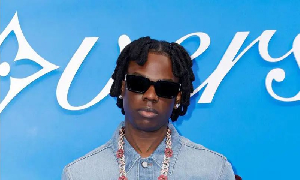Uganda are the latest team at the Africa Cup of Nations to get embroiled in a dispute over payments.
The Cranes are through to the second round after finishing second in a group containing hosts Egypt and DR Congo. But their players boycotted training on Tuesday.
The country’s FA, Fufa, has said the players are trying to “renegotiate” their remuneration.
It is the fourth pay dispute to hit the tournament so far.
Nigeria had similarly refused to train after not receiving a $10,000 (£7,940) match bonus that had been promised.
Meanwhile, Cameroon arrived in Egypt late after an unresolved row over bonuses. The players had refused to get on the plane - the same tactic they employed at the 2014 World Cup.
And there were concerns that the opening game would not even happen after suggestions came from the Zimbabwe camp that the players had threatened to boycott the match against the hosts Egypt.
Ultimately that game did go ahead.
Exercising pressure
Why do these strikes continually afflict African teams at major tournaments?
In a word - leverage.
The way that payments work in tournaments is that the further a team goes, the greater the amount of money they receive. Thus, success in major championships have the potential to bring revenue to a country’s football federation.
In theory, some of that money should end up with the players as bonus payments - they should also receive some money for qualifying.
For players based in major European leagues, those tournament payments are not necessarily a huge amount in comparison to their club wages.
All of England’s players, for example, donated their bonuses for their surprise run to the semi-finals of the 2018 World Cup to charity.
But for players based in African leagues, those payments constitute a great deal of money.
Indeed, last season in Cameroon, not only bonuses but basic wages from the clubs were not being paid, forcing players across the country’s top divisions to stage a series of strikes.
Eventually, former Indomitable Lions captain Geremi Njitap filed a complaint direct to Fifa, which resolved the matter.
But the episode highlighted the important role that international appearance bonuses have for some players.
Sometimes, however, these payments do not appear after the tournaments. Some football associations have little accountability; others are opaquely managed - and even end up being suspended by Fifa.
Over time, players have grown deeply distrustful of the very football federations they are picked to represent.
So, aware that after a tournament their ability to exercise pressure individually on their FA is greatly diminished, they strike before the competition begins.
By threatening not to play, players create a double bind for their countries. Not only would it be damaging for their image, it also would dramatically reduce any money that the FA would be looking to get themselves.
The tactic has proved effective over the years - having been employed by at least one African team at every World Cup since 1990.
What’s more, star names in teams over the years, such as George Weah and Didier Drogba, have been much higher-profile than their country’s FAs - and have not been afraid to use their presence to support their less well-known (and well-off) team-mates.
Indeed at some tournaments, a country’s president has had to personally intervene in order to get things going again.
Famously, in Brazil in 2014, $100,000 payments for Ghana were flown in, in cash in briefcases, and unloaded at the airport in Rio - where the Brazilian authorities took a 17% cut before the money was sent out across the city to the players.
Nothing like that has happened in Egypt - but nevertheless, the disputes don’t seem to be going away any time soon.
Sports News of Thursday, 4 July 2019
Source: bbc.com
2019 AFCON: Why do African teams continue to threaten strike action?
Entertainment












